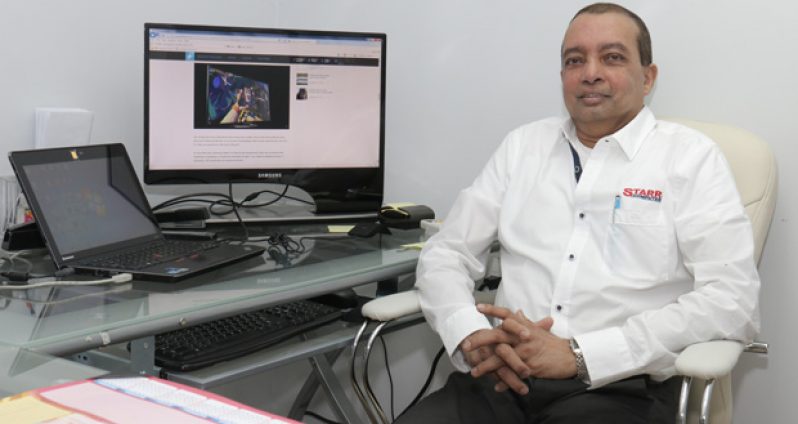By Rabindra Rooplall
LOCAL technology giant STARR Computers, is supporting the call of the U.S. and UK Ambassadors to embrace the harnessing of renewable energy and going ‘green’.U.S. Ambassador to Guyana Perry Holloway and British High Commissioner Gregory Quinn had expressed their support for Guyana’s move to a ‘green’ economy, while attending the Mayor and City Council (M&CC)’s “Green Expo” earlier in the month.
President of Starr Computers Michael Mohan is of the opinion that renewable energy could generate revenue for investors by up to 25%, and that with the help of the government, this will then reduce unemployment in Guyana by over 10%.
Most importantly, he says, renewable energy has the capacity to reduce a country’s carbon footprint, save foreign exchange and increase productivity.
Over the past nine years, he said, Starr has been able to implement its own hybrid system, which incorporates the use of both solar panels and wind turbines. And, when used in combination with other energy-efficient sources of electricity, saw the recovery of total capital cost in less than seven years, even though solar panels cost more back then.
Giving a more detailed account of what Starr has been able to achieve in those nine years, Mohan said: “July 2006, STARR installed two 1,000-watt wind turbines and an additional 8,000 watts of solar panels.
“Then, upon acknowledging the cost savings benefit, STARR decided to add Renewable Energy presentations to its monthly, free seminars to the public, whereby students, employed and unemployed personnel were regularly invited to participate and enjoy a field trip to STARR facilities to experience the energy-harnessing process.
“Even international vendor partners from Samsung, APC, Lenovo, and others were highly motivated to visit STARR facilities to share the experience and appreciate the technology in action.”
BEYOND RENEWABLE ENERGY
Noting that going ‘green’ goes beyond the installation of Renewable Energy components for STARR, Mohan said reflective heat paint application is used to reduce heat absorption, while mini wind-generated heat extractors are strategically placed on the building’s roof to pump trapped hot air out of the ceiling. Energy-efficient air conditioners are also a must to help cut back on the use of energy.
Then, over time, old lighting fixtures were replaced with energy-efficient bulbs. By then, STARR had gotten so adept at keeping their energy consumption down that new GPL energy analysts and loss-reduction personnel visiting the facility for the first time were often aghast as to how the company was able to do it.
But the long and short of it all, as Mohan explained, was having a fair knowledge of the engineering and benefits behind energy efficiencies, and this is what helped the company, over time, to develop the Portable Solar station and its own Green PC (iMachine) that operated on as little as 26 watts of energy (less than a light bulb).
As he explained, “Every business and individual can benefit significantly, if they decide to invest in solar panel installation…
“Sunshine is free! And in abundance in Guyana! And the low-priced solar panel is the perfect choice for Guyanese. “Today, initial capital cost can be recovered in five years, and electricity-harnessing thereafter will be virtually free for at least 10 years.”
He has this theory that should the government get GPL to upgrade its system to support tie-grid solar systems as is done in Germany and other developed countries to allow for energy ‘buy-back’, investors’ earnings could skyrocket from solar investment.
WIN-WIN SITUATION
It’s a win-win situation for everyone. Investors with surplus cash can easily generate revenue by setting up arrays of solar panels to harness energy, then sell it back, at a discounted rate, to the power grid (GPL).
GPL can then generate revenue from the resale of discounted energy; the country can save on foreign exchange; and our next generation can benefit from cleaner air.
But it doesn’t stop there. A ‘green’ economy will create new job opportunities for installers, construction workers and innovators. Institutions such as the Government Technical Institute (GTI) could easily be restructured to become a self-sufficient revenue centre with earnings via tutorials for technicians and installers.
And, as demand grows for solar panels, factories can be set up here in Guyana, using our local sand to produce silicon, a much-needed ingredient in the production of panels, the surplus of which can then be exported.
STARR encourages businesses, schools, government agencies and other organisations to embrace and adapt this technology for the good of all.



.jpg)








